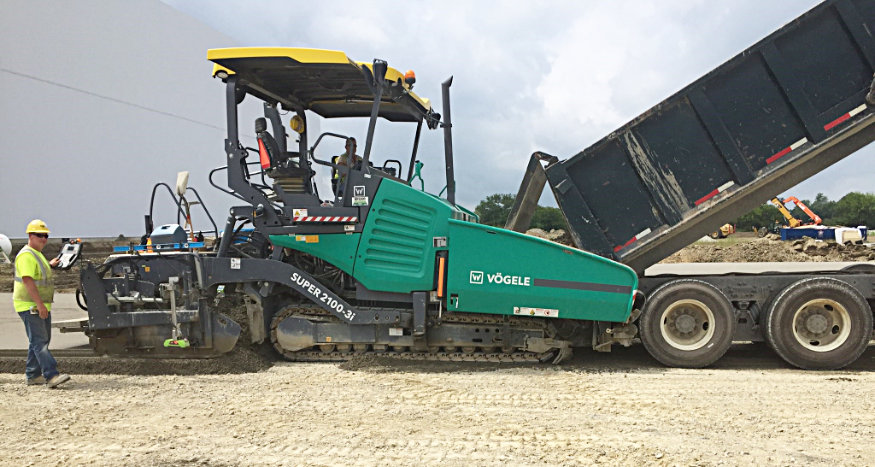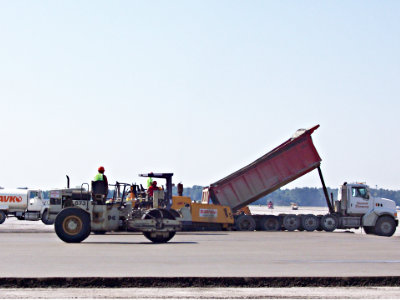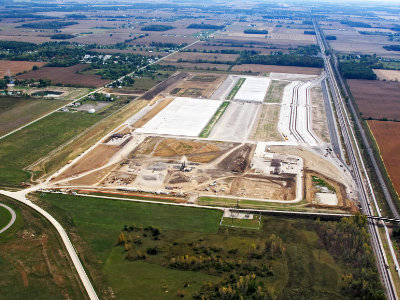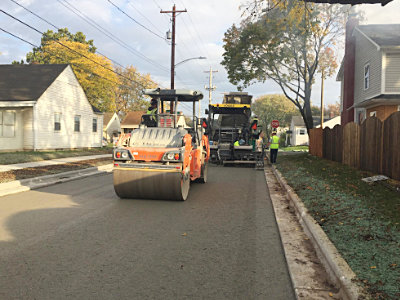Roller Compacted Concrete (RCC)
Roller Compacted Concrete (RCC) is a type of pavement used for heavy-use or industrial pavement when strength and durability are especially important.
RCC applications include staging and storage areas, loading docks, parking, streets and intersections, and low-speed roads in intermodal facilities, distribution centers, residential subdivisions, and multifamily developments.
RCC has the strength and performance of conventional concrete with the economy and simplicity of asphalt. RCC allows traffic onto the pavement much sooner than conventional concrete, allowing contractors to deliver time-critical projects faster.

RCC Delivers a Stronger Pavement Faster at Less Cost
- Strength: RCC provides a stronger overall pavement section that resists rutting and will not deform under heavy, concentrated loads.
- Lower cost: Instead of a typical 20-30” section of stone and asphalt combined, RCC can be placed directly on compacted soil with no stone base in many cases. Because the concrete is placed with conventional or high-speed asphalt pavers, an RCC placement crew requires about half as many workers as a conventional pour. RCC requires no steel reinforcement and no forming, adding even more labor and material savings.
- Saves time: RCC allows traffic on the pavement a lot sooner than conventional concrete (3-4 days vs. 7-10 days), so the vertical construction can start sooner.
How RCC is put in place:
- Subgrade preparation follows the same compaction processes and testing prior to placement as conventional pavements.
- Mix: RCC has the same basic ingredients as conventional concrete, but in different ratios. RCC is a drier mix that essentially has no slump and is stiff enough to be compacted by vibratory rollers.
- Placement: RCC does not need forms, finishing, or steel reinforcing. Conventional or high-speed asphalt pavers place the very stiff concrete mixture on the prepared subgrade.
- Compaction provides the density, strength, and smooth surface texture and is the most important stage of construction. The concrete receives an average of four passes with a 10-ton vibratory roller, depending on site conditions.
- Curing: RCC’s hydration process is shorter because the moisture in the mix is so low, but a curing compound is still needed.
- Asphalt: Often a 1-2” asphalt layer is added over RCC pavement to help seal and protect the concrete from salt damage and to provide a smoother driving surface.
RCC inspection services
GCI has provided engineering, laboratory testing, and field testing for RCC projects since 2001. Services include:
- Thickness and composite mix design consulting
- On-site observation and testing during placement
- Laboratory testing including compressive strength, split tensile strength, and flexural strength tests of both cores from in-place RCC and laboratory-prepared test samples
- Feld testing using nuclear density gauge
- Coring services for required post-placement testing
To learn more about RCC pavement and design or testing services, contact:
David DeLong - ddelong@gci2000.com
Direct: 614.839.1276




